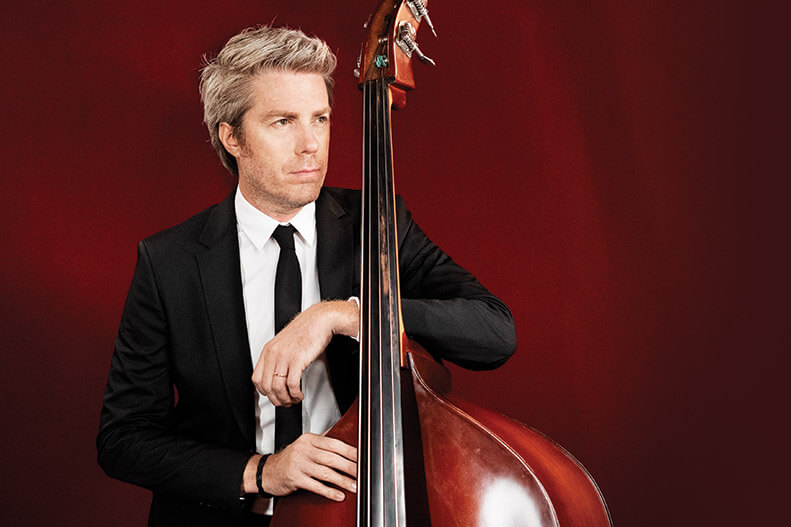
In the mid-1960s, the sons of two of Hollywood’s biggest stars teamed up to form a pop band, eponymously named “Dino, Desi and Billy.” Dino’s father was Rat Packer Dean Martin; Desi was the son of “I Love Lucy’s” Desi Arnaz and Lucille Ball (he played Little Ricky as a child on the show). Billy was a buddy with no show biz bona fides. The boys made no attempt to distance themselves from their marquee names…in fact they relied on them. This was a mediocre act at best—one critic said the group “never had an ounce of credibility”—but they charted a couple of modest hits.
No such criticism can be leveled at Kyle Eastwood. Yes, his father Clint is one of the most instantly recognizable personalities in the world. But that’s the only commonality Kyle has with Dino and Desi. Eastwood the younger has carved a distinguished career as a top-tier jazz bassist and bandleader, releasing nine albums—including 2019’s “Cinematic,” and touring extensively all over the world. He’s performed at the Monterey Jazz Festival eight times since 1994. Oh, and critics are deservedly kinder to Eastwood. One noted: “the bass player embodies the vitality of an art which he reinvents with elegance and passion.” That’s credibility.
That elegance and passion are on full display on “Cinematic,” a collection of classic film soundtrack compositions.
“I’ve always wanted to do an album of all movie tunes,” Eastwood says. He has recorded film music in the past, including, unsurprisingly, work on his father’s films “Gran Torino” (which he co-composed), “Letters from Iwo Jima,” “Million Dollar Baby,” “Flags of Our Fathers” and “Mystic River.” He’s included several pieces from films the elder Eastwood is associated with such as “Gran Torino,” “Unforgiven” and “The Eiger Sanction.”
“The rest are compositions by my favorite film composers,” Eastwood says.
Ennio Morricone, the Italian composer who penned the classic theme for the career-making Clint Eastwood vehicle, “The Good, the Bad and the Ugly,” is on his short list.
“He’s in the top two or three,” Eastwood says. “He writes beautifully haunting music. He’s one of the greatest composers of sad and romantic themes.”
No doubt, given the bassist’s background, an album like this was bound to happen. In his review of “Cinematic,” London Jazz News critic Rob Mallows stated, “There is a sort of divine inevitability that the bassist—son of film director Clint Eastwood—would succumb to the temptation.”
Although Kyle Eastwood was born in Los Angeles, the son of Clint and Maggie Eastwood, he grew up in small-town Carmel and attended Robert Louis Stevenson School, where he caught the music performance bug.
“I studied piano a bit when I was a kid,” he says. “I started playing with some friends at Stevenson who were pretty good musicians. I picked up the electric bass because it seemed like they were always shy a bass player.”
Eastwood attended film school at USC for a time—he also appeared in a few of his father’s films as an actor, including “Honkytonk Man”—before deciding he’d rather spend his time behind a bass than in front of a camera. The aspiring musician studied with Grammy-nominated Bunny Brunel, who has held down the low end with such jazz greats as Chick Corea, Herbie Hancock and The Tony Williams Lifetime.
“He took me under his wing and made me learn to read music,” Eastwood recalls.
“Cinematic” features Eastwood’s excellent London-based touring band: Andrew McCor-mack on piano, drummer Chris Higginbottom, tenor man Brandon Allen and Quentin Collins on trumpet. In addition, French singer Camille Bertault lends sultry vocals to Michel Legrand’s “Les Moulins de mon Coeur”—American ears will recognize the melody from its English version, “The Windmills of your Mind,” in the 1968 film, “The Thomas Crowne Affair,” sung by Noel Harrison. Hugh Coleman croons “Gran Torino,” co-written by the Eastwood father-and-son team, along with Jamie Cullum and Michael Stevens. The record was beautifully recorded in Paris and is a fine addition to the Eastwood oeuvre and family legacy.
Although Kyle plays both electric and acous-tic, “upright” bass, on “Cinematic” he chose to stay mainly with the upright.
“Which instrument I play depends entirely on the song. I let the groove dictate which to use,” he explains. “The acoustic seemed appropriate to this music.” Most of it, anyway. Once exception is the ephemeral, evocative electric work he added to the “Unforgiven” track.
“We recorded this album mostly live. The band played most of them at shows before we went in-to the studio. Ideally, it’s nice to have run through songs live in front of an audience before recording.”
The band continues to perform these songs live. “We’ve changed things already,” Eastwood says. “Songs evolve on the road, arrangements are altered. We try to play them differently every night. It keeps things interesting.”
What’s next? The road. The band heads to China and Japan for February and March and then several European dates through the spring.
“We’ll be touring with this new music for about a year or so. At this point, I’m not thinking about the next record yet.” Although not yet booked, Eastwood hopes to bring his band to perform at the 2020 Monterey Jazz Festival September 25-27.
“It’s always great to come back and play the festival,” he says. “It’s one of my favorite festivals to go to and I try to make it even when I’m not playing.”
It’s doubtful that Dino and Desi would have gotten anywhere near a recording contract if their last names were Miller or Smith. The fact that Kyle Eastwood has carved out a successful and respected jazz career without trading on his father’s fame is due to talent, determination and hard work.
For a tour schedule and to purchase Eastwood’s music visit kyleeastwood.com.